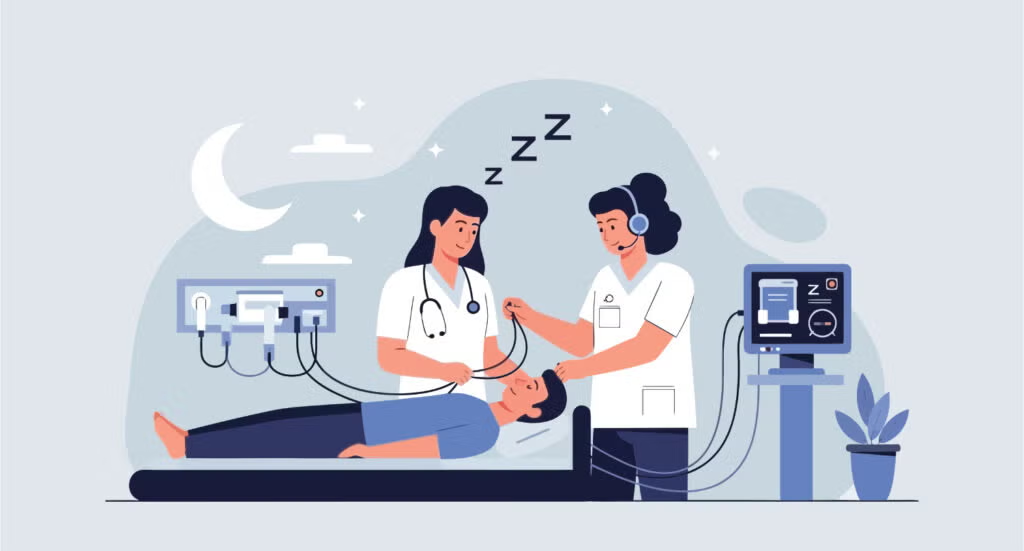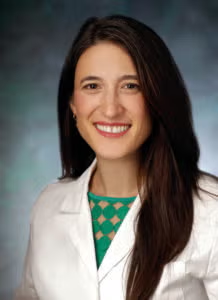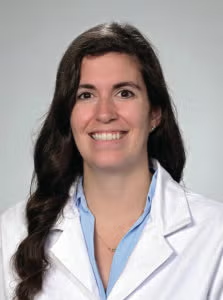Sleep breathing disorders are widespread yet often underdiagnosed conditions affecting millions of patients globally. Obstructive sleep apnea (OSA) involves both airway anatomy and physiology, making otolaryngologists uniquely positioned to help lead the multidisciplinary care of the OSA patient. The management of OSA requires evaluation of the upper airway and often includes optimizing continuous positive airway pressure therapy or determining a patient’s candidacy for alternatives, many of which are surgical interventions. The field is rapidly evolving, with new devices and procedures that are a far cry from the use of tracheostomy in the 1960s and 70s. Despite the explosion of innovation in the surgical treatment of sleep apnea, choosing the right patient for the right procedure remains a challenge. Sleep fellowship can help.
Subspecialty Certification in Sleep Medicine
For otolaryngologists interested in demonstrating advanced knowledge of sleep disorders, the American Board of Otolaryngology–Head and Neck Surgery offers subspecialty certification in sleep medicine. However, since 2011, double-board certification in sleep is only accessible to otolaryngologists who have completed an extra year of training in sleep medicine through an Accreditation Council for Graduate Medical Education (ACGME) fellowship program. As a result, the number of sleep medicine board-certified otolaryngologists has decreased, with only 34 surgeons completing a sleep-focused fellowship between 2017 and 2025, but the field could not be more exciting or ripe for greater otolaryngology involvement.
An increasing number of fellowship programs offer sleep medicine and sleep surgery and/or hybrid training. The hybrid programs integrate training with a sleep surgeon alongside the ACGME sleep medicine requirements, allowing graduates to read sleep studies and obtain dual board certification while advancing their surgical skills and understanding of patient selection and factors predictive of surgical success.
The State of Sleep Surgery Fellowships
A recent study by Kaffenberger et al. (Laryngoscope. doi: 10.1002/ lary.31749) explored trends among otolaryngologists completing sleep-focused fellowships. Between 2017 and 2023, 26 otolaryngologists completed a sleep-focused fellowship and were sent an anonymous survey assessing fellowship program characteristics and post-graduate job prospects. Of 19 respondents, the majority (53%) completed a hybrid ACGME-certified sleep medicine and sleep surgery program. Surgical exposure most commonly included hypoglossal nerve stimulators, pharyngoplasty, and nasal surgery, while exposure to other soft tissue and skeletal surgeries or investigational procedures varied.
The survey also highlighted the strong demand for dual board-certified otolaryngologists. Sleep-trained surgeons were highly coveted, receiving on average 2.4 job offers, with one-third reporting four or more offers. Additionally, 55% returned to their residency institution, and 90% secured positions in academic settings.
Why Should You Consider Sleep Fellowship?
Sleep fellowship is a pathway to focused expertise, intellectual rigor, improved patient care, and opportunities for meaningful contributions in a rapidly evolving field. To further elaborate, there are several reasons to consider a sleep fellowship:
Deepen expertise in OSA and the full spectrum of sleep disorders—A dedicated sleep fellowship bridges the gap between surgical training, the physiology of obstructive sleep apnea, and the broader spectrum of sleep disorders that may impact the sleep apnea patient. Through raw data interpretation of sleep study signals, fellows develop a keen understanding of what is and is not obstructive sleep apnea. Furthermore, sleep fellowship expands clinical competency to include the neurologic, behavioral, and pharmacologic aspects of sleep care, allowing ENTs to understand the additional factors that may influence patient symptoms and the option of providing comprehensive sleep care, as OSA patients often have more than one sleep disorder. Whether you hope to exclusively see sleep apnea patients or are a generalist with a sleep focus, fellowship training provides a foundational understanding of OSA and the factors influencing patient selection and surgical success.
Intellectual challenge and multidisciplinary care—Every patient’s airway during sleep is a unique combination of anatomy, ventilatory drive, and collapsibility. Choosing the right therapy for the right patient can be an intellectual challenge. The sleep ENT is challenged to match each patient’s anatomy, physiology, and goals with acceptable anatomically based treatment options. Fellowship-trained ENTs can provide surgical care and also effectively coordinate care across specialties when needed.
Patient health outcomes—Patients with untreated OSA not only increase their cardiovascular risk for developing disorders like high blood pressure, stroke, and heart disease, but also suffer from excessive daytime sleepiness, poor concentration, short-term memory loss, and snoring. The consequences of untreated OSA have a significant impact on quality of life and work productivity and are known to include increased motor vehicle accidents and increased healthcare system burden/costs. The ability to improve quality of life and provide positive health and economic benefits through our treatments is unparalleled and priceless.
Research opportunities and innovation—There is an ongoing need to deepen our understanding of the physiology underlying OSA and the impacts of anatomy-focused treatments. Moreover, there is an increasing demand for innovative and alternative treatments for OSA, and alongside this, a responsibility to evaluate and critique new devices and technologies. Sleep fellowship-trained ENTs are uniquely positioned to be involved with industry and clinical trials and evaluate safety, efficacy, and appropriate patient selection.
Join a thriving community—A vibrant international sleep surgery network of professionals is passionate about OSA and improving patient outcomes. The International Surgical Sleep Society was founded in 2006 and has more than 600 global members. We highly recommend attending an International Surgical Sleep Society Meeting to see what we’re all about!
Excellent job market and lifestyle— The survey results speak for themselves! More specifically, sleep fellowship training opens the door to diverse career opportunities in academic medicine, private practice, and sleep centers, while offering the ability to diversify your practice with non-operative work and providing an excellent lifestyle.
If we haven’t convinced you yet, we hope you will reach out. We, and the sleep surgery community as a whole, would be ecstatic to share why we love what we do and why you, too, should consider a sleep fellowship.
Dr. Triantafillou completed her sleep medicine/sleep surgery fellowship at the Hospital of the University of Pennsylvania in Philadelphia in 2025. She is currently a laryngology fellow at Johns Hopkins University in Baltimore.
Dr. Rodin is an assistant professor of otolaryngology–head and neck surgery at the Hospital of the University of Pennsylvania, co-director of the CPAP Alternatives Clinic, and assistant director of the otolaryngology residency program at the University of Pennsylvania in Philadelphia.



With more and more exposure in residency to the surgical techniques we need to look at options that don’t involve a year of lost revenue learning about sleep disorders and sleep studies. The majority of surgeons that do a sleep fellowship are not treating a bulk of sleep medicine diseases, they’re still focused on strictly obstructive sleep apnea.
The academy and ISSS should be focused on offering a fellowship in the ISSS that teaches those who are interested during a series of courses over a two year time span only involving 4 weekends over that time. A basic, advanced and sleep study deep dives into what we need to know out in practice. À la the FAAOA does for otolaryngologic allergy. Otherwise I’m concerned that in the future as everyone that was grandfathered will have a serious lack of availability of doctors in the next few years.